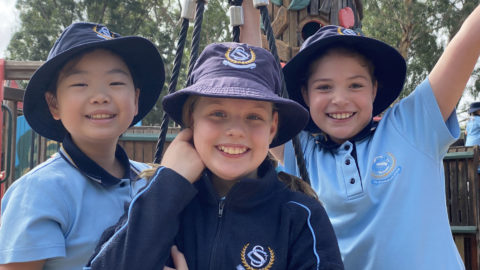Principal Update – Our girls are older, younger

Our Barbreck parents may hopefully find some time to undertake reading of a different nature over the forthcoming mid-year break, and if this is the case, I recommend Madonna King’s newly released book, Ten-Ager. Ten-Ager provides insight into the lives of our 10-year old daughters and nieces and grandchildren.
Madonna King’s research entailed the advice of 500 10-year-old girls across Australia, along with 1600 mums, 400 dads and 100 Year 5 teachers. In addition to this, she interviewed dozens of school principals, guidance officers and teen psychologists to navigate the issues raised by the girls. In a recent interview on Channel 7, Madonna shared her insights that I have highlighted below.
 Unsurprisingly, the introduction of the smartphone has brought about a variable that means the lives of our 10- year old is vastly different to that of their once ten-year-old parent, and even to that of their big sister, who were only ten years a few years ago.
Unsurprisingly, the introduction of the smartphone has brought about a variable that means the lives of our 10- year old is vastly different to that of their once ten-year-old parent, and even to that of their big sister, who were only ten years a few years ago.
Undoubtedly, this impact of social media has played a significant role in shaping the lives of teenage girls in the 21st century. Our girls are now older, younger. They access content on social media that they do not understand and might not even have been available when their big sisters were 10. The more mature girls in the class pass on information to those who still believe in unicorns, and the difference in knowledge and interests in this age group makes it really difficult for everything from friendship to teaching.
At ten years of age, it is difficult to rationalise what one sees on social media, often believing it to be true. They don’t understand perfect holiday snaps can be photoshopped, or that people don’t look like that in ‘real life’. It makes them too often believe, they need to change.
The average ten-year-old falls into Piaget’s ‘Concrete Operational’ stage. This stage is recognised by less egocentricity and is marked by more logical and methodical manipulation of symbols. The main goal at this stage is for a child to start working things out inside her head, this is called operational thought, and it allows kids to solve problems without physically encountering things in the real world. As children get older, parents and teachers expose them to a variety of age-appropriate learning-by-doing experiences which enables broadening the experience to applying them to new, even hypothetical situations.
In researching for her book, Ten-Ager, Madonna King learned that experts believe puberty actually begins at the age of six or seven, and it this ‘under the bonnet’ changes that we cannot see, that can often dictate how a girl copes as she navigates independence. It is often that at this age, when their self-esteem and mental health can be developed. Menstruation is really just the visible, late stage of puberty with much occurring prior to this point in terms of development.
King also notes that quite concerningly, the number of girls who decide on their life’s trajectory at 10. They decide whether they are a ‘maths/science’ girl or whether they will continue with netball, dance or swimming. Experts say their brain at 10 years cannot possibly know what they will be good at. Importantly, parents and schools must have a heightened awareness of the self-imposed limits that can stop their journey. Knowing students, and knowing them well, can have a significant advantage at this point in time.
In the interviews with the 500 ten-year-olds, Madonna King became aware that ‘friendships’ was the biggest issue, and sadly, being ‘tall’ has become something that is no longer an attribute. Many, many girls told King that being tall was ‘horrible’ and prevented them from feeling good or fitting in with peers.
It became very apparent, ten-year-old girls want their parents and teachers to listen and to help them navigate an adolescence where self-esteem, anxiety and friendship problems is robbing them of happiness. They want their parents to give them a touch of independence, but to be their backstop.
In reading Ten-Ager, I became intensely interested in our Year 5 classes in Barbreck and to seek to really understand how they are feeling. In responding to some of my questions to our Year 5 classes the girls provided the following insightful answers:
- I like being ten because I am double digit. You get trusted more.
- I like being able to be independent by going on lots of walks with my friends. This helps me be social and active.
- I turn double digits! I have been trusted with certain things.
- I think when you are ten, relationships can change with people you have been friends with for a long time, and girls can change. Work at school can also change and work is different and more challenging.
- You start to have the expectation of doing lots of things you do not want to do.
- My advice to younger students would be to firstly help out their parents a bit more than usual, because then if you upset them you can just say why don’t we start cutting up stuff for dinner. There is also that fact that you might become moodier when you are tired, so if you can tell that is going to happen, then just try to do something alone.
- If you’re just turning ten, then I think some advice would be keep persisting and never give up.
- I would say get ready for what is coming and the responsibility and the organisation you need to have when coming into Year 5.
 At St Catherine’s, our Year 5 and 6 cohorts have commenced an Ambassador Leadership Program this year that focuses on learning the characteristics of being a good leader and strong team member. Encompassed in the skill development of public speaking and time management is an emerging understanding of one’s strengths and capabilities. The girls will also achieve their eSmart Licence, an initiative of the Alannah and Madeline Foundation, that captures the associated risks of being online and how best to manage them. It embraces the best of technology, while reducing its associated risks.
At St Catherine’s, our Year 5 and 6 cohorts have commenced an Ambassador Leadership Program this year that focuses on learning the characteristics of being a good leader and strong team member. Encompassed in the skill development of public speaking and time management is an emerging understanding of one’s strengths and capabilities. The girls will also achieve their eSmart Licence, an initiative of the Alannah and Madeline Foundation, that captures the associated risks of being online and how best to manage them. It embraces the best of technology, while reducing its associated risks. 
We are fortunate to have the strengths of the highly experienced team of Miss Kirrilly Wootton and Miss Fiona Wardlaw teaching across this cohort at St Catherine’s. Their knowledge of the girls captures the appropriate level of challenge each one needs in the classroom, and this is encompassed within a culture of care and joy of learning that is embraced by both Miss Wardlaw and Miss Wootton and our Barbreck teachers.


